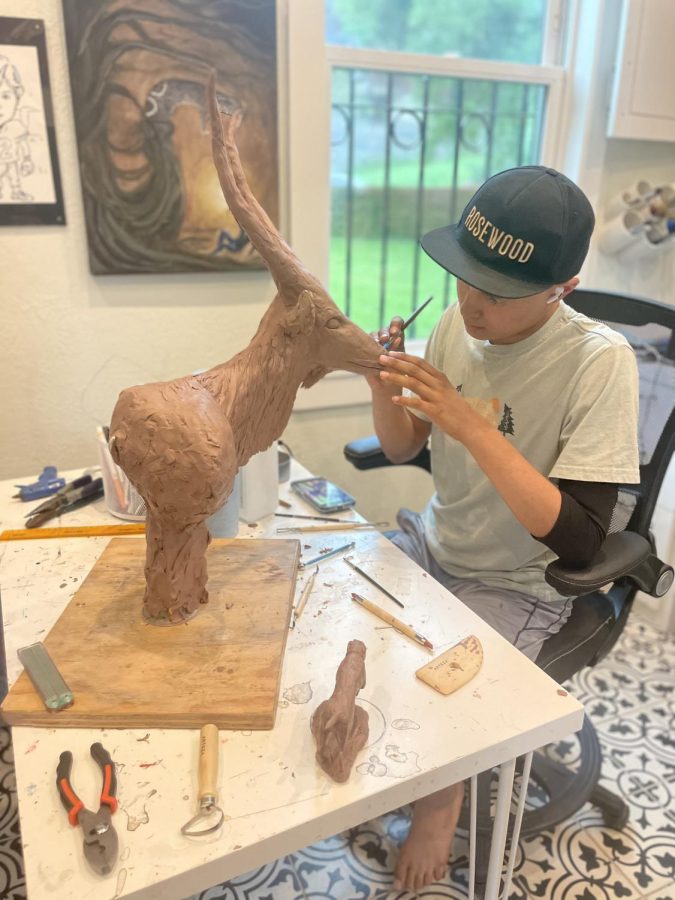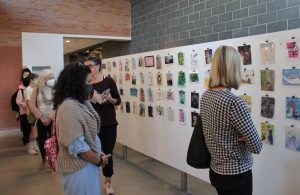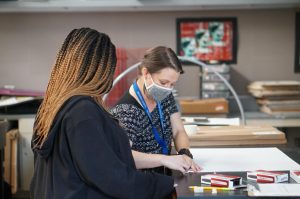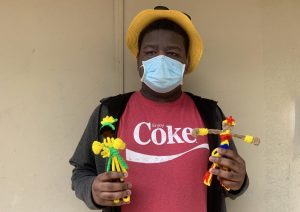Cancer can’t stop Callan
Talented junior artist stays optimistic throughout diagnosis and chemotherapy, continues to create art and win in VASE
Junior Callan Spence working on a sculpture of the University of Texas Longhorn mascot. Spence sees the UT fine arts program as one of many possibilities for his future as an artist. Photo courtesy of Chas Spence.
May 26, 2022
When junior Callan Spence discovered his passion for art, it was clear that he had something special. In his freshman year, one of his first-ever sculptures won the Gold Seal award in the VASE state event, and, since then, his sculptures and paintings have continued to beat out thousands of other pieces in regional and state competitions.
His artistic talent, however, is not the only thing that makes Callan different from your typical high school student. In January, large tumors were found growing near his lungs and he was diagnosed with a rare form of cancer.
“It was obviously a shock,” he said. “And oddly enough a relief because I’ve had these symptoms since early October, just kind of a slow decline in my well-being.”
In October 2021, Callan began to notice pain in his neck. Over the next few months, he developed a persistent cough and was diagnosed with walking pneumonia. A scan in January revealed something different: a cloud over his lungs, which was soon identified as a soft tissue cancerous tumor, under the diagnosis umbrella of synovial sarcoma.
He learned that his right lung had collapsed and that his body had been operating using only his left for several months. The tumor was pressed against his rib cage near his heart and his throat, compromising his respiratory system and vital organs.
Callan and his family were stunned.
“Just a few weeks ago we were snow skiing,” his father Chas Spence said. “He was freediving to 60 feet in the Caribbean and getting his scuba certification. [He] was doing a lot of breath holding activities and little did we know he was operating on one lung.”
The search for an effective treatment plan began immediately. Unfortunately, research on synovial sarcoma, especially in adolescents, is limited. The Spences met with Brian Gourley, a family friend, father of a cancer survivor, and founder of CureWheel.org. CureWheel utilizes data from public medical journals and studies to compile lists of cancer experts for specific diagnoses. The Spences used CureWheel to begin finding experts who could help with Callan’s case.
After meeting with doctors at Dell Children’s Hospital in Austin, the MD Anderson Center in Houston, and later specialists from the Children’s Hospital of Philadelphia (CHOP), Callan began chemotherapy and radiation in hopes of shrinking his tumor so that it can be surgically removed in the future.
“To think that he’s gonna be having open heart surgery with neurologists, pulmonologists, cardiologists, radiologists, respiratory surgeons, 20 people in the room over 12 hours to try and rebuild him, it’s insane,” Chas said. “And you look at him, and other than his bald head and [being] down 15 pounds from his normal weight, you wouldn’t know [that he has cancer].”
His treatments have been proceeding successfully but the time spent traveling between hospitals around the country, along with the exhausting side effects of chemotherapy and proton radiation, means Callan’s had to stay in and out of school, working online in a way reminiscent of early in the pandemic.
“It’s a little disappointing,” he said. “I felt like I was having a really solid junior year, first semester, just a lot of fun things going on. Kept all my grades under control. And then there was just a roadblock.”
Throughout treatment, Callan has continued to create.
“I just pick one of the assignments that Mr. Martinez gives me, like I had all throughout the year, and then I just start working on that one and send progress pictures,” he said.
[huge_it_portfolio id=”59″]
The art department and artistic community of McCallum have been invaluable to Callan’s journey as an artist, beginning when he was a freshman working in Art I foundations. Teachers like William Cauthern and Jeffrey Seckar-Martinez helped him to expand into new mediums, like sculpture and oil painting.
“Callan is great,” Martinez said. “He’s got a lot of great insight. He tends to look at the world with a very personal eye, so he’ll put a lot of his own perspective into what he creates.”
Sculpting in particular has been a big, but also “easy and fun,” change for Callan. Even though he only began sculpting in high school, his natural talent for the craft makes his pieces one of a kind.
“It’s something that I could just do without having a bunch of stress on whether it’s looking right or like whether the paint’s drying or like all these time limits,” he said. “With sculpting [time] just falls away. It doesn’t exist, you can just work it back and forth until you’re satisfied with what it is.”
His bust titled Fever Dream was a Gold Key and scholarship winner in VASE this past year and recently won the Bill Bagley Memorial Scholarship. His piece was 1 of the 5 nominees for the American Vision Medal out of 1,200 submissions and is now on tour in NYC. While Callan’s dad thinks that the surrealist-inspired bust “was almost a premonition to all the emotions that we would face,” Callan himself had a different inspiration.
“You know those heads from Spy Kids, like the first Spy Kids. Like the heads stuck together?” he said. “Yeah, that.”
Although many aspects of Callan’s life have changed since his diagnosis, he feels that his artistic perspective has remained constant.
“I’m doing the same stuff,” he said. “Maybe it’s a flaw in my art, but I don’t tend to get very emotional in my art. It’s not like a release mechanism. It’s more of like, a tool of expression if that’s any different.”
In April, the Spences settled on a team for Callan’s surgery, which is currently scheduled for June at the CHOP facility. Despite the risks accompanied with the complicated procedure, the prospect doesn’t scare Callan.
“I do not dread it,” he said. “I look forward to it.”
After recovering from the operation, Callan hopes to get his life back to normal.
“I’m hoping senior year will be a pretty good year,” he said. “And a pretty good end to high school. We’re still looking into colleges, still trying to make that decision and not throwing away every option just because there was a roadblock.”
Despite the open-ended plans for the future, Callan hopes to transfer his visual arts training at McCallum to university in his pursuit of a fine arts degree.
‘‘I’m looking into a traditional kind of fine arts major and then also a design and kind of game design major, maybe in radio [or] television departments or something like that,” he said. “RISD is definitely on the list. Also, I think MassArt. And then also, UT Austin. Those are kind of the big three that I’m looking into.”








Vicky Oberheim-Vorwald • Jun 29, 2022 at 1:22 pm
Keep that attitude! GO Callan!!!